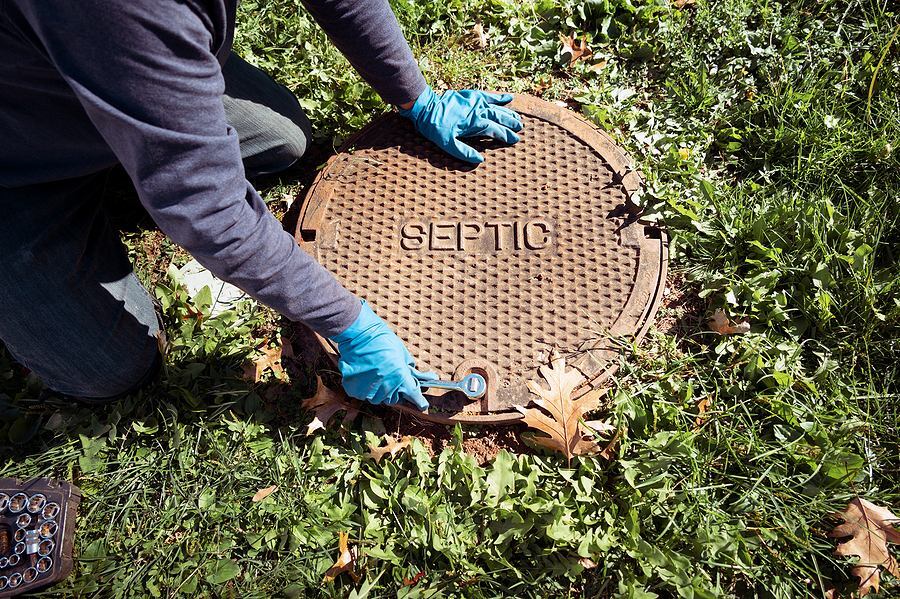Free Septic System Inspection ($99 Value) Free enzyme treatment, Financing Available
Request Service Now!
407-565-7044Free Septic System Inspection ($99 Value) Free enzyme treatment, Financing Available
Request Service Now!
407-565-7044
When managing household waste, homeowners generally have two options: septic systems or sewer connections. Each system has its own benefits and drawbacks, and understanding these differences can help you make the best choice for your property. Septic Blue has compiled ten important facts about septic systems vs. sewers so you can make informed decisions about septic tank installation.
Septic Systems: Homeowners who use a septic system are responsible for its maintenance. This means regular septic tank pumping, cleaning, and repair. A septic company can provide these services and help keep the system functioning well.
Sewers: In contrast, municipal governments manage sewer systems. Homeowners pay fees for sewer services but don't handle the maintenance directly.
Septic Systems: Installing a septic system can be expensive. Septic tank installation often requires significant excavation and labor, which can range from $3,000 to $10,000 depending on the size and type of the system.
Sewers: Connecting a home to a municipal sewer system is typically less expensive upfront, but homeowners may have to pay connection fees if their property is not already connected.
Septic Systems: To avoid costly repairs, homeowners should regularly schedule septic tank pumping and septic tank cleaning. Generally, septic tank pumping is recommended every 3 to 5 years.
Sewers: Sewer systems require little to no direct maintenance from homeowners. The city or municipality takes care of regular upkeep.
Septic Systems: A properly maintained septic system can be environmentally friendly. Wastewater is filtered naturally through the soil before entering groundwater. However, a neglected system can leak and cause contamination.
Sewers: Wastewater from sewers is treated at a central facility before being discharged into local water bodies. While treatment facilities are designed to minimize pollution, overflows, and untreated discharges can occur.
Septic Systems: With proper maintenance and septic tank repair, a septic system can last 20 to 40 years. The lifespan depends on the quality of septic tank installation and regular upkeep by a septic company.
Sewers: Sewer systems are designed to last much longer, often up to 50 years or more, and municipal maintenance ensures their longevity.
Septic Systems: Septic systems are ideal for rural or suburban areas where municipal sewers are unavailable. Properties with sufficient land for a drain field and appropriate soil conditions can easily support a septic system.
Sewers: Sewer systems are more common in urban areas with infrastructure. Connecting densely packed homes to a central treatment facility is more efficient than installing separate septic systems.
Septic Systems: A well-maintained septic system shouldn't negatively affect property value, but buyers might be wary if the system is old or in need of septic tank repair. Having records of regular septic tank pumping and cleaning can reassure potential buyers.
Sewers: Homes connected to a sewer system may have a slight advantage in the market because buyers know they won’t have to handle septic maintenance.
Septic Systems: In emergencies, such as flooding or damage, a septic company can help with septic tank repair and pumping. However, backups can still happen if the system is overwhelmed.
Sewers: Municipal sewer systems may also back up during heavy rains or floods. City crews typically handle repairs, but the homeowner may be responsible for internal plumbing issues.
Septic Systems: While septic tank installation can be expensive, the long-term costs may be lower than sewer fees if the system is properly maintained. Homeowners must factor in regular septic tank pumping and occasional septic tank repair.
Sewers: Sewer fees can add up over time. Homeowners should compare sewer services' monthly or yearly costs against the potential savings of using a septic system.
Septic Systems: Local governments often have strict septic tank installation and maintenance regulations. Septic companies can help homeowners navigate these rules to ensure compliance.
Sewers: Sewer systems are governed by municipal regulations, and homeowners must follow local connection and fees guidelines.
Deciding between a septic system and a sewer connection depends on many factors, including location, budget, and maintenance preferences. Septic systems offer independence but require regular maintenance, such as septic tank pumping and cleaning by a septic company. Sewer systems, managed by local governments, offer convenience but have ongoing fees. Understanding these facts can help homeowners make an informed decision that best suits their needs.
Do you know what happens to the wastewater once you open the plug in your kitchen sink or flush the toilet? If you live off the main…
Septic systems play a crucial role in businesses and homes without a municipal sewer line. If you rely on an on-site septic system, prioritizing preventive maintenance is…
Septic systems play a crucial role in managing waste for residential and commercial properties without public sewer lines. While most systems are designed to last for decades,…
A failing septic system is a nightmare that can cost thousands of dollars to repair and leave your property unusable until the problem is fixed. The frustrating…